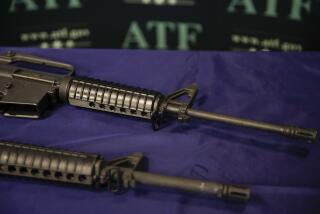Brands Seek to Knock Off Counterfeiters
Coca-Cola Co., Nike Inc. and other corporate logo owners are joining together to combat what they say is the latest and most dangerous threat to their famous brands.
Software programs are being sold over the Internet that can be used to instruct machines to etch onto glass or vinyl, or stitch onto clothing perfect copies of Coca-Cola’s contour bottle, the Nike swoosh or Walt Disney Co.’s Mickey Mouse.
The trademark owners have used letters, threats and the courts to try to protect their brands from bootleggers. The new software programs are potentially more devastating because they allow counterfeiters to distribute perfect copies of logos anywhere in the world.
“There’s no doubt in my mind that these seedy logo cases are starting to crop up,” said Frederick Mostert, author of “Famous and Well-Known Marks” and former president of the International Trademark Assn. “That’s the fallout where technology is enormously beneficial to society, but there’s also a price to pay.”
Disney, Nike, Coca-Cola and companies such as Polo Ralph Lauren Corp., Levi Strauss & Co., Toyota Motor Corp., AOL Time Warner Inc. and BP are pursuing a novel legal strategy and have sued one of the software makers they say is responsible for the new crop of knockoffs.
The federal lawsuit was filed in May in Orlando, Fla., against Rick Hedrick and his company, Zmax Digital Graphics Systems Inc. The suit does not accuse Hedrick of making or selling counterfeit merchandise, rather it accuses Hedrick of creating software that contains perfect copies of logos and instructs machines how to put the logos onto products. The lawsuit is believed to be one of the first of its kind.
The suit is similar to those brought against landlords of flea markets whose tenants sell knockoffs, analysts say.
Hedrick gives his clients a choice--they can either download logos directly from one of several Web sites, or buy a CD-ROM that can be delivered anywhere, according to his sites and the lawsuit.
“Usually, counterfeiters sell the product that bears the trademark,” Mostert said. “Here, what you’re selling is just the trademark, the brand name itself.”
Other software makers sell logos. They can be used legally by small retailers to create advertisements for sales, or by publications that are writing about a product.
The difference between those software makers and ones like Hedrick, according to the suit, is that his software is being used for illicit purposes, and he didn’t do anything to stop it even after repeated warnings from logo owners.
“People shouldn’t be allowed to put their head in the sand when they know illegal activity is going on,” said Tim Trainer, president of the International AntiCounterfeiting Coalition.
There are no reliable figures for counterfeit products sold in the U.S. each year. The International Chamber of Commerce has estimated that as much as 7% of global trade is in bogus goods from copyright and trademark infringements. The anti-counterfeiting group has said trademark infringement drains about $200 billion a year from the U.S. economy.
The Web “has made copying so much easier, faster, instantaneous and perfect, as the proliferation of counterfeiting on the Internet has demonstrated,” Mostert said.
With the Internet, counterfeiters can go to a company’s Web site, download or otherwise copy digital images of the famous marks, and duplicate them for use in bogus merchandise.
The software program containing the images can then be multiplied on thousands of CD-ROMs and shipped around the world, trademark lawyers said.
For years, bootleggers have transported unlabeled counterfeit products across borders without interference, attaching bogus logos after passing through customs.
The software makes it easier, and the logos are of a higher quality because they are digital images.
It’s the perfection of the image that makes software such as Hedrick’s so pernicious, companies say. Counterfeit T-shirts often include steamed transfer images that are handmade and amateurish enough that any average consumer can tell it’s a knockoff.
With digital images, it’s impossible to tell the difference from a phony picture of Coca-Cola’s contour bottle and “The Real Thing.”
“The Coca-Cola Co. owns some of the world’s most valuable trademarks, and we protect them aggressively,” said company spokeswoman Kari Bjorhus. “We do not tolerate infringers or those who enable others to infringe.”
Attempts to reach Hedrick by e-mail were unsuccessful. Coca-Cola, Disney and their fellow logo owners didn’t have much luck either.
According to their suit, they’ve pursued Hedrick for at least two years, and court documents show he isn’t making it easy for them to deliver to him a copy of the suit.
Still, several trademark owners say this lawsuit may set an example for other cases--either in warning would-be knockoff artists or giving them ideas.
“This potentially could have huge implications whichever way it goes,” Mostert said.
More to Read
Inside the business of entertainment
The Wide Shot brings you news, analysis and insights on everything from streaming wars to production — and what it all means for the future.
You may occasionally receive promotional content from the Los Angeles Times.










